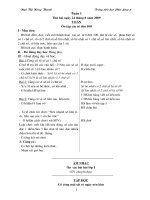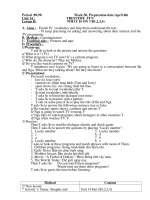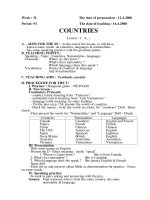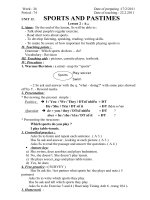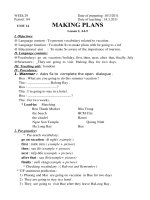Giao an
Bạn đang xem bản rút gọn của tài liệu. Xem và tải ngay bản đầy đủ của tài liệu tại đây (173.85 KB, 13 trang )
<span class='text_page_counter'>(1)</span><div class='page_container' data-page=1>
Teacher’s name : TRẦN MỸ LỆ
Grade : 9
<b>UNIT 8 : CELEBRATIONS</b>
<b>Period 1 : Getting started – Listen and read</b>
<b>I.</b> <b>Objectives: </b>By the end of the lesson, Ss will be able to :
- Know more about the popular celebrations in the world.
<b>II.</b> <b>Language Contents:</b>
Vocabulary: occur, decorate, celebrate, celebration, freedom, slavery, Jewish people,
parade, sugar or chocolate eggs…
Grammar :
Relative clauses, beginning with Relative pronouns : WHO, WHICH….
<b>III.</b> <b>Techniques:</b>
Questions – Answers
True – False .
Pair – group work.
Matching
<b>IV.</b> <b>Teaching Aids :</b>
- Pictuers (page 65 - 66), textbook, chalks, hand-outs, Cassette recorder and tape.
<b>V.</b> <b>Time: 45minutes</b>
<b>VI.</b> <b>Procedures:</b>
<b>New lesson</b>
<b>STEPS& </b>
<b>TIMES</b>
<b>TEACHER’S AND STUDENTS’ ACTIVITIES</b> <b>CONTENTS</b>
<b>Warm-up</b>
<b>5’</b>
<b>Questions – Answers:</b>
- Ask SS some questions about the latest holidays they
have spent.
+ What celebration have you had?
+ What activities did you do at Tet?
+ What food did you eat?
- Ss give their answers.
<b>Lead-in</b>
<b>7’</b>
<b>1. Getting started :</b>
<b>* Matching – Pair work:</b>
- Paste some pictures of celebrations on the board and
aks Ss to match the names of celebrations with the
pictures.
- Ss do the matching task in pairs.
- Ss give their ideas.
- With each picture, ask Ss some questions.
+ What are these?
+What food do they eat?
+ Who are they?
+ What are they doing?
<b> Matching: </b>
<b>1 – Easter</b>
<b>2 – Wedding</b>
<b>3 – Birthday</b>
<b>4 – Christmas</b>
<b>5 – Mid-Fall Festival</b>
<b>6 - Tet – Lunar New Year</b>
<b>Practice</b>
<b>2. Listen and read:</b>
- Give the Ss a guiding question and ask them to listen
</div>
<span class='text_page_counter'>(2)</span><div class='page_container' data-page=2>
<b>20’</b> to the tape ( 1 st time) (book closed).
<b>+ What celebrations are mentioned in the text?</b>
<b>* Pre-teach vocabulary:</b>
- Ss answer the questions. While listening to the Ss’
answers, T explains vocabulary.
- Ask SS to say about three celebrations. Say:
+ What do you know about it?
+ In what country is it celebrated?
+ What food do they eat at Tet?
+ What activities do they do at Easter?
+ When / In what day can you see parades?
<b>* Explain the structure:</b>
WHO, WHICH : Relative Pronouns the clauses
beginning with R.Pronouns are called “ Relative
Clauses”
- Ask Ss to fill in the gaps.
<b>* Complete the table :</b>
- Ask SS to listen to the tape ( 2nd<sub> time) and then </sub>
complete the table in pairs.
- While SS are doing the complete task, ask some Ss to
read the text aloud.
- Ask Ss some questions to make sure they understand
the lesson.
+ What do Vietnamese People do at Tet?
+ What activities do they do on Easter Day?
+ What food do Jewish people in Israel eat on Passover
nights?
- Ss give their answers and complete the table.
Celebration When? Activities Food Country
- Correct the mistakes if any.
<b>mentioned in the text?</b>
Passover, Tet and Easter.
<b>New words:</b>
<b>- Passover (n)</b>
Jewish people
<b>- slavery (n)</b>
slave(s), slaver(s)
<b>- freedom (n)</b>
<b>- chocolate or sugar eggs</b>
<b>- colorful parade(s)</b>
<b>- occur = happen (v)</b>
<b>- Sticky rice cake</b>
<b>Structure:</b>
<b>Who </b>
<b>Which Relative Pronouns</b>
<b>1/ who</b> <b>3/ who</b>
<b>2/ which</b> <b>4/ which</b>
Celebration When? Activities
Tet Jan or
Feb. Clean decorate
homes.
Passover March
or April
Easter March
or April parades
Food Country
Sticky rice
cake
Vietnam
Seder Israel
Sugar,
chocolate
eggs
In many
countries
<b>Production</b>
<b>10’</b>
<b>Discussion: Group work</b>
- Ask Ss to give some more information about the other
celebrations they know.
- Ss give their ideas.
Celebrations : Mother’s / Father’s Day, Valentine’s
Day, Birthday, Halloween, Flower Festival, ….
- Ask Ss to say about the day they choose in groups.
- Call some groups to perform their work before the
class.
<b>Consolidati</b>
<b>on &</b>
<b>Homework</b>
<b>3’</b>
<b>- Ask Ss to complete the sentences with suitable </b>
<b>word.</b>
<b>1. celebration</b>
<b>2. decorate</b>
<b>3. Jewish</b>
<b>4. Jewish parades.</b>
<b>Homework:</b>
<b>- Learn vocabulary and the </b>
<b>structure by heart.</b>
</div>
<span class='text_page_counter'>(3)</span><div class='page_container' data-page=3>
EXPERIENCE & EVALUATION:
</div>
<span class='text_page_counter'>(4)</span><div class='page_container' data-page=4>
Teacher’s name : TRẦN MỸ LỆ
Grade : 9
<b>UNIT 8 : CELEBRATIONS</b>
<b>Period 2 : Speak & Listen </b>
<b> </b>
<b>I.</b> <b> Objectives : </b>after the lesson, students may
Develop speaking skill
Give a compliment and respond a compliment.
<b>II. Language contents :</b>
Expressions used in compliment : well done; That’s a great / an excellent . . ., let
me congratulate you on . . ., and respond to a compliment : Thanks, It’s nice of
you to say so, That’s very kind of you.
<b>III. Techniques :</b>
Guessing.
Brainstorming
Conversations.
<b>IV. Teaching aids :</b>
Give a compliment and respond to a compliment.
Pictures (of 4 situations)
<b>V. Time : 45’</b>
<b>VI. Procedures :</b>
<b>A. Speak : 25 minutes</b>
<b>Step</b> <b>Activities</b> <b>Content </b>
<b>Warm up (3’)</b>
<b>Pre-speaking</b>
<b>(7’)</b>
T makes some situations :
“You see your friend who is wearing a new shirt.
You compliment him on it”.
- You : Your new shirt is very pretty, Long.
- Long : Thanks. My mother made it for me
on my birthday.
T says that he / she has just given a compliment
and responded to a compliment. There are
another ways to give and respond to a
compliment.
T asks Ss to read the following situations with a
partner, then give and respond to appropriate
compliments.
a) Trang has just won the first prize in the
English speaking contest.
b) On her mother’s birthday, Huyen made a
beautiful cake to celebrate.
c) Tuan is an active student. He has taken
part in different charity activities in his
town. Tuan has been nominated as the
most effective activist in the town charity
program.
T explains some new words before giving
a. Mai : Well done, Trang.
Trang : Thanks.
b.Mother : Well done, Huyen.
Huyen : Thanks, Mom
c.Friends : Congratulations on
</div>
<span class='text_page_counter'>(5)</span><div class='page_container' data-page=5>
<b></b>
<b>While-speaking (10’)</b>
<b>Post-speaking</b>
<b>(5’)</b>
the next situation:
d) Hoa brings to class a new picture she has
painted.
* T asks Ss to practice these dialogues in pairs.
* T writes on the board some expressions and
ask ss to copy down :
* T asks Ss to practice the situations :
“ Now think of situations in which you can
compliment your friends and get responses from
him / her / them then make up dialogues with
your partners.”
a) Your friend invites you to the new house his
parents have just bought. You compliment on
it.
b) You see your friend with his new hairstyle.
You compliment him.
c) You see your friend going on a new bicycle.
You compliment on it.
T asks some pairs of Ss to play the roles before
the class. T can ask them to achieve the new
dialogues with their own situation such as a
conversation between a mother and daughter, a
boy and his sister, or friends.
- <i><b>charity</b></i> / / (n)
- <i><b>nominate</b></i> / / (v)
d. You : That’s an excellent
drawing, Hoa.
Hoa : That’s very kind of you to
say so.
Ss write down in their notebooks
then learn by heart.
o Give a compliment
- Well done .
- That’s a great / an
excellent . . .
- Let me congratulate
you on . . .
o Responses
- Than
ks
- It’s
nice of you to say so
- That’
s very kind of you.
Ss practice in pair:
a) A : What a nice house you
have !
B : Really ? That’s nice of you
to say so.
b) A : Hi, Mai. I almost didn’t
recognize you with your
hairstyle. It looks great !
B : Do you really like it ? Thanks .
c) A : You know, I like your
new bicycle, especially its
color.
B : Thanks, I’m glad you like
it.
<b>B.</b> Listen : 20’
<b>Steps</b> <b>Activities</b> <b>Content </b>
<b>Pre-listening</b>
<b>5’</b>
<b>Pre-teach vocabulary:</b>
- Explain the new words & expressions.
- Introduce the lesson.
<i>“ Auld Lang Syne in Scotland language means </i>
<i>Old Long Days. It is sung on New Year Day.”</i>
<b>* New words:</b>
<b>- acquaint acquaintance (n)</b>
<b>- trusty (a)</b>
</div>
<span class='text_page_counter'>(6)</span><div class='page_container' data-page=6>
<b>Guessing task :</b>
- Ask Ss some questions about the song?
+ How many spaces are there in the song?
+ Can you guess what words are in the
blanks?
- Let Ss guess the answers in pairs. It isn’t
necessary to correct them right now.
<b>+ There are 5.</b>
<b></b>
<b>While-listening</b>
<b>10’</b>
<b>Task 1 : Listen and fill in the missing </b>
<b>words:</b>
- Have Ss to listen to the tape ( twice) and check
their guess.
- Give feedback.
<b>Task 2 : Listen and sing the song</b>
- Play the tape again and ask Ss to sing the song
chorally.
- Call on some Ss to translate the song into
Vietnamese.
<b>Answers:</b>
<b>a/ days</b>
<b>b/ take</b>
<b>c/ mind</b>
<b>d/ hand</b>
<b>e/ kindness.</b>
<b>Post- listening</b>
<b>3’</b>
- Ask Ss to write the song into the notebooks.
<b>Homework</b>
<b>2’</b>
<b>Homework:</b>
<b>- Write the dialogs to the </b>
<b>exercise “ Speak” ( b, c, d) in </b>
<b>the notebooks.</b>
<b>- Think of the other situations to</b>
<b>give a compliment and </b>
<b>response to a compliment.</b>
EXPERIENCE & EVALUATION:
</div>
<span class='text_page_counter'>(7)</span><div class='page_container' data-page=7>
Teacher’s name : TRẦN MỸ LỆ
Grade : 9
<b>Unit 8: Celebrations</b>
<b>Period 3 (Read)</b>
<b>I. Objectives</b>
After the lesson, students may
Develop reading skills
Know more about the opinions, feelings, and memories of children about their farther on
father’s Day in the USA and in Australia.
<b>II. Language contents</b>
Vocabulary: considerate, generous, priority, distinguish, terrific
<b>III. Techniques </b>
Questions – Answers
Brainstorming
Discussion
<b>IV. Teaching aids</b>
Text books
<b>V. Procedures</b>
1/ Previous lesson.
2/ New lesson:
Steps Activities Content
Warm up <b>Questions - Answers:</b>
- Do you know any songs about fathers?
- Do we have Father’s day in Vietnam? Ss’ answers
Pre-reading Introduction:
- T introduces the new lesson : Father’s day in Australia
and in the USA. Say:
+ What do you know about Father’s Day in the USA and
in Australia?
+ When is it celebrated?
+ What do they do on this day?
+ What qualities do you think a Father should have ?
Pre-teach vocabulary:
- Explain the new words:
Explanation : give s.o a hug
Translation
Translation
Translation
Synonym : be disappointed
Explanation : To make a person different from the
others.
- Ask them to read these words individually.
- It’s on the 3rd<sub> Sunday of June.</sub>
- They send cards, flowers, gifts, and they get
to have dinner together.
<b>New words:</b>
Hug (n)(v);
Priority (n);
Humor (n) Sense of humor;
humorous (a)
Considerate (a)
To lose heart
Distinguish (v);
While - reading Task 1 : Read the text and answer the
questions:
- Play the tape and ask Ss to listen to the tape and
follow in their books, then work in pairs to answer the
questions / p. 68-69.
- SS listen and then do the task in pairs.
</div>
<span class='text_page_counter'>(8)</span><div class='page_container' data-page=8>
- Ss give their answers.
- Correct the mistakes.
- Ss write the answers on the board.
<b>Task 2 : Discussion: </b>
- Ask each student to talk about his/her father. Say:
<i>+ If anyone asks you who your Father is, what will you</i>
<i>say?</i>
- Ss discuss in groups – practice telling about their own
Father.
- Some Ss present their ideas before the class.
- Give feedback
<b>Answers: </b>
a)She sends this card to her Dad
b) He is possibly dead. These ideas may
tell about that: …how much you are
missed …, …I now have children, Dad
…
c) His sense of humor.
d)
A father is as a teacher, a good friendand a care-taker.
Post-reading <b>* Writing cards:</b>
- Encourage Ss to use the ideas above to write a card to
their Father.
Homework Homework:
Have students write their feelings, opinions
and memories about their parents.
EXPERIENCE & EVALUATION:
</div>
<span class='text_page_counter'>(9)</span><div class='page_container' data-page=9>
Teacher’s name : TRẦN MỸ LỆ
Grade : 9
<b>Unit 8 : CELEBRATIONS</b>
<b>Lesson 5 : WRITE</b>
I. OBJECTIVES : By the end of the lesson , students will be able to :
Write to a friend to share their ideas.
Develop their writing skill.
II. LANGUAGE CONTENTS
Grammar : relative clause
Vocabulary : enhance, have a day off, support, nationwide
III. TECHNIQUES
Question – Answer
Brainstorming.
Questions- Answers.
Pair- Group work.
IV. TEACHING AIDS
OHP
Text books.
Posters.
V. TIME : 45minutes
VI. PROCEDURES
1/ Old lesson.
2/ New lesson.
<b>STEPS</b> <b>ACTIVITIES</b> <b>CONTENT</b>
<b>Warm – up</b>
<b>(5’)</b>
<b>Group work</b>
*Word Square :
- Divide the class into two teams.
- Have students go to the board and circle
the words they find.
The team which circles more words will win
the game.
<b>Pre-writing</b>
<b>(10’)</b> <b>I. Pre teach vocabulary:</b>
Explanation
Translation/ example
Synonym : help
Translation
* Checking vocabulary:
VOCABULARY
- enhance (v) : add to the value, size, beauty of …
- have a day off : get away from work or duty
- support (v) : help, give strength to
- nationwide (adv) : over the whole of a nation
<b>C</b> <b>E</b> <b>L</b> <b>E</b> <b>B</b> <b>R</b> <b>A</b> <b>T</b> <b>E</b> <b>M</b>
<b>S</b> <b>I</b> <b>F</b> <b>L</b> <b>O</b> <b>W</b> <b>E</b> <b>R</b> <b>S</b> <b>E</b>
<b>P</b> <b>K</b> <b>P</b> <b>O</b> <b>P</b> <b>R</b> <b>S</b> <b>T</b> <b>U</b> <b>M</b>
<b>E</b> <b>O</b> <b>N</b> <b>M</b> <b>O</b> <b>Y</b> <b>W</b> <b>W</b> <b>V</b> <b>O</b>
<b>C</b> <b>I</b> <b>A</b> <b>L</b> <b>F</b> <b>O</b> <b>O</b> <b>D</b> <b>Z</b> <b>R</b>
<b>T</b> <b>R</b> <b>A</b> <b>D</b> <b>I</b> <b>T</b> <b>I</b> <b>O</b> <b>N</b> <b>Y</b>
<b>F</b> <b>I</b> <b>A</b> <b>O</b> <b>D</b> <b>C</b> <b>B</b> <b>A</b> <b>N</b> <b>M</b>
<b>I</b> <b>G</b> <b>I</b> <b>L</b> <b>M</b> <b>N</b> <b>D</b> <b>R</b> <b>A</b> <b>C</b>
</div>
<span class='text_page_counter'>(10)</span><div class='page_container' data-page=10>
<b>II. Ordering </b>
- Ask students to keep their books closed,
show the outline on the board.
- Get students to put the parts into the
correct order.
<b>OUTLINE </b>
(1) Give details about :
when to celebrate: in what season,
or what month , on what day of the
month or day of the week… (why ?)
how to celebrate : having parties,
sending cards, going on picnics …
what special gifts to give : gifts to
moms, gifts to dads.
what special food to offer.
(2) State whether or not you think your idea
will be supported and you hope the day will
be celebrated nationwide.
(3) Tell your friends the reason(s) for
celebrating this day.
ANSWER KEY
paragraph 1 => (3)
paragraph 2 => (1)
paragraph 3 => (2)
<b></b>
<b>WHILE-WRITING</b>
- Introduce the context, explain the the aim
of the writing.
- Ask students to read the outline carefully,
explain the content of the letter.
- Let students discuss in pairs to find out the
main ideas.
- Ask some students to express their
opinions before class.
- Have students write individually to a friend
to tell / her about why they want to
celebrate Mother’s Day or Father’s Day in
Vietnam and how to celebrate it. The outline
on page 70 will have students to write
easily.
<b>SUGGESTED IDEAS :</b>
<i>In my opinion, it is essential to have a day to</i>
<i>celebrate for our parents.</i>
<i>On these occasions, children will have a special day</i>
<i>to express their feelings, memories and love for</i>
<i>their parents. We have an opportunity to enhance</i>
<i>family traditions. Members of families can have a</i>
<i>chance to get together, to know one another and to</i>
<i>help one another.</i>
<i>I think first Sunday of April is suitable. Sunday is a</i>
<i>day off so everybody is free from work or study.</i>
<i>April is late spring or early summer, and the weather</i>
<i>is generally fine at this time of the year. Many</i>
<i>activities can happen outdoors. </i>
<i>It is not necessary to have parties but it is a good</i>
<i>idea to have lunch or dinner with all members of the</i>
<i>family. Children should give their parents flowers,</i>
<i>send them cards, or bring them a special cake.</i>
<i>Moreover, children should serve their parents the</i>
<i>food that they like best.</i>
<i>I believe the idea will be supported and the day will</i>
<i>be celebrated nationwide because everybody loves</i>
<i>their parents and want their parents to be happy.</i>
<b></b>
<b>POST-WRITING</b> - Have students share their writing with theirpartners .
- Ask some students to read aloud their
writing before class.
- Get students to give their opinions
- Correct mistakes.
HOMEWORK - Have students write their letter on their notebooks.
</div>
<span class='text_page_counter'>(11)</span><div class='page_container' data-page=11></div>
<span class='text_page_counter'>(12)</span><div class='page_container' data-page=12>
Teacher’s name : TRẦN MỸ LỆ
Grade : 9
<b>UNIT 8: CELEBRATIONS</b>
<b>Period 5 : Language focus 1 – 2 – 3 – 4</b>
<b>I. Objectives :</b>
By the end of the lesson, students will be able to use relative clauses :
WHO – WHICH – ADVERBIAL clause of concession: Although.
<b>II. Language contents</b>
Grammar: Relative clauses, Adverbial clause of concession.
<b>III. Techniques :</b>
Questions – Answers.
Pair- Group work.
Brainstorming
<b>IV. Teaching aids</b>
Text books, pictures
<b>V. Time: 90 minutes</b>
<b>VI. Procedures</b>
<b>Steps</b> <b>Activities</b> <b>CONTENT</b>
<b>Warm up</b>
<b>Presentation</b>
- Greetings
- Ask Ss to talk about the person they love most.
<b>I. Pre teach vocabulary: </b>
Translation
Translation
Synonym : happen
Synonym : please
Real object
Picture
guesture
<b>II. Presenting Relative clause:</b>
- Write four examples on the board:
- Ask Ss to find out the relative clause : Adjective
clause.
1a. Relative clause Defining clause
1b. Relative clause Non defining clause.
2a. Non defining clause.( giving us extra information
about the person or thing.)
2b. Relative clause Defining clause
- Explain the use of relative pronouns :
WHO-WHICH. Say :
<i><b>WHO - WHICH: relative pronouns replace the</b></i>
<i><b>pronouns. Who is used for people, WHICH is used</b></i>
<i><b>for things.</b></i>
- T. asks SS to open the books and to read the example
in task 1:
- T. asks ss “Which occurs in late January or early
February is Defining clause or Non Defining clause”?
Ss answers: Defining clause
<b>New words:</b>
- Compose (v)
- Culture (n)
- Occur (v)
- Satisfy (v)
- Violet (n)
- Jumper (n)
- Lap (n)
EX: 1a. The man is a good teacher. He
teaches English very well.
The man who teaches English very well
is a good teacher.
<b> 1b. This man is a good teacher. He</b>
teaches English very well.
This man, who teaches English very well,
is a good teacher.
<b> 2a. The film “Romeo and Juliet” was</b>
interesting.It was seen on TV last night.
The film “Romeo & Juliet”, which was
seen on TV last night, was interesting.
2b. The book is expensive. I bought the
book yesterday.
</div>
<span class='text_page_counter'>(13)</span><div class='page_container' data-page=13>
<b>Practice</b> <b>Task 1</b>
- ss combine these sentences by using Who – Which.
(some pupils)
- Ss distinguish Defining and Non defining clause.
T. corrects.
<b>Task 2</b>
T. explains how to do this exercise.
Ss do it at home
Task 1:
a) Auld Lang Syne is a song which is
sung on New Year’s Eve.
b) This watch is a gift which was given
to me by my aunt on my 14th
birthday.
c) My friend, Tom, who sings Western
folk songs very well can compose
songs.
d) We often go to the town cultural
house which always opens on
public holidays.
e) I like reading books which tell about
different peoples and their cultures.
f) On my mum’s birthday my dad
gave her roses which were very
sweet and beautiful.
g) The full-moon festival which Judy
liked very much is celebrated in
mid-fall.
h) Tomorrow I’ll go to the airport to
meet my friends who come to stay
with us during the Christmas.
<b>Task 3 </b>
Ss read sentence a and write it on the board.
T. explains: This is an adverbial clause of concession
with “although, though ...”
(Mệnh đề chỉ sự nhượng bộ bắt đầu bằng
although, even though, though)
T. asks ss to do task 3:
T. corrects
<i><b>Although</b></i>
<i><b>Though</b></i> <i><b>+ clause</b></i>
<i><b>Even though</b></i>
<i>(mặc dù)</i>
<b>Task 4</b>
T. explains how to do this exercise
Although đi với mệnh đề nguyên nhân
T. corrects
<b>Task 4</b>
b) …., she is still watching TV.
c) …, the weather bureau predicted the fine
weather.
d) Ba ate a lot of food though he wasn’t
very hungry.
e) …, she managed to finish the letter.
<b>Production</b> T. dilivers the worksheet
Ss do the worksheet Combine these sentences, using
Who-Which-Although
1. The waitress was friendly. She
served us dinner (Who or which)
2. The house at the end of the street
has just been sold. It has been
empty for two years (who or which)
3. The picture is beautiful. Tom is
looking at it (who or which)
4. He stopped to buy a sandwich. He
was late (although)
5. Yesterday I met John. He told me
he was getting married. (who or
which)
Homework
- Do “task 2”
</div>
<!--links-->
